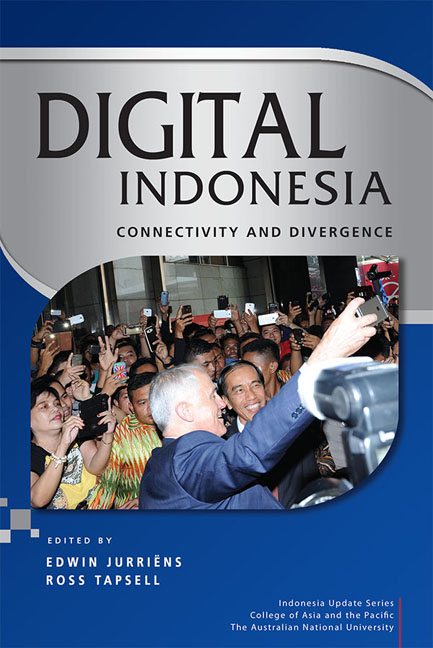Book contents
- Frontmatter
- Contents
- Tables
- Figures
- Contributors
- Acknowledgments
- Glossary
- Map of Indonesia
- 1 Challenges and opportunities of the digital ‘revolution’ in Indonesia
- PART 1 CONNECTIVITY
- PART 2 DIVERGENCE
- PART 3 IDENTITY
- 8 Digital activism in contemporary Indonesia: victims, volunteers and voices
- 9 Social media and Islamic practice: Indonesian ways of being digitally pious
- 10 Online extremism: the advent of encrypted private chat groups
- PART 4 KNOWLEDGE
- PART 5 COMMERCE
- Index
- Indonesia Update Series
9 - Social media and Islamic practice: Indonesian ways of being digitally pious
from PART 3 - IDENTITY
Published online by Cambridge University Press: 12 January 2018
- Frontmatter
- Contents
- Tables
- Figures
- Contributors
- Acknowledgments
- Glossary
- Map of Indonesia
- 1 Challenges and opportunities of the digital ‘revolution’ in Indonesia
- PART 1 CONNECTIVITY
- PART 2 DIVERGENCE
- PART 3 IDENTITY
- 8 Digital activism in contemporary Indonesia: victims, volunteers and voices
- 9 Social media and Islamic practice: Indonesian ways of being digitally pious
- 10 Online extremism: the advent of encrypted private chat groups
- PART 4 KNOWLEDGE
- PART 5 COMMERCE
- Index
- Indonesia Update Series
Summary
Like ‘non-digital Indonesia’, ‘digital Indonesia’ is a realm of diverse religious expressions and practices. This is true in particular of those digital spaces that are inhabited by Indonesian Muslims. Today, we can observe myriad ways in which the internet and social media are turned into platforms of Islamic mediation. As I will show in detail in this chapter, the popularity of online Islamic practices has increased hugely in Indonesia due to the growth of ‘smart’ communication technologies and social media. The latter provide ample opportunities for Muslims to exhibit both visual and textual material, including people's expressions of piety, and to explore new forms of religious practice and sociality. Social networking sites in particular have become a focal point for displaying Indonesia's many ‘Islamic faces’. Appearing pious on social media has evolved into a major ‘cultural genre of content’—to borrow the phrase used by Daniel Miller (2011: 212) to designate the prevalent forms of online presence in particular (national) contexts. My own interest is in Indonesian ways of being digitally pious as these are reflected in both online and offline Islamic practices. I also attempt to tackle a bigger question, namely what the consequences of these digitalisations of Islamic practices might be for Indonesian Islam at large. My conclusions are necessarily preliminary, since the changes taking place in Indonesia today are being driven not just by religious verve, but also by new social formations, cultural ambiguity and rapid technological change.
Even the naive observer of religious life in Indonesia today would quickly realise that Indonesian Muslims have embraced social media in their daily religious lives, where we find great creativity and variety in the use of smartphones and apps (Barendregt 2012: 215). A devout Muslim I interviewed in Yogyakarta told me, for example, that when picking up her children from school, she likes to wait in her car where she can recite the Qur'an undisturbed thanks to a digitised version of the Qur'an she has saved on her smartphone.
- Type
- Chapter
- Information
- Digital IndonesiaConnectivity and Divergence, pp. 146 - 162Publisher: ISEAS–Yusof Ishak InstitutePrint publication year: 2017

